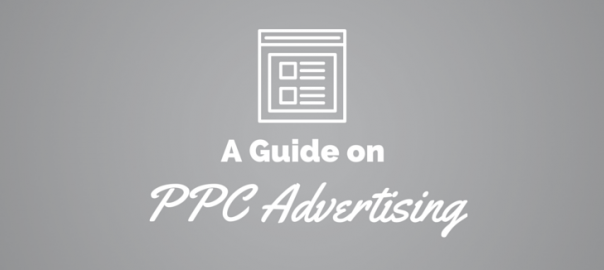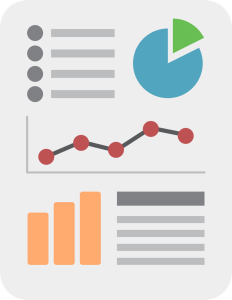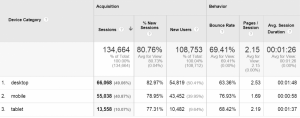
What? What is… what is this thing? PPC?
We often write about PPC here at eZanga. After all, eZanga specializes in online advertising, and PPC is a huge part of advertising. You’re probably here because you want to know what the heck it is. Or perhaps you need a bit of a refresher or overview.
Well GOOD NEWS EVERYONE.
We’re going to give you a little crash course in PPC. Welcome to PPC 101
What Is PPC?
PPC stands for pay per click. PPC ads are online advertisements that you pay for by the click. So every time someone clicks on your ad, you pay a little bit of money. Sometimes you’ll see it called CPC (cost per click). It’s the same thing.
Are There Different Kinds of PPC Ads?
You bet! When you design an ad campaign, you usually pay incrementally. PPC is perhaps the most common way to pay for your ads. However, it’s just one of many. Here are some examples of other methods that are offered in the industry:
- Pay per call—pay for every call you get as a result of an ad
- Pay per impression (PPI)—pay for each person who sees the ad
- Pay per mille (PPM)—pay for every 1000 people who see the ad (mille is the roman numeral for thousand)
- Pay per thousand—same as pay per mille
- Pay per action/acquisition/conversion (PPA)—pay for every time the ad leads to someone fulfilling a certain action (filling out a form, downloading an ebook, etc)
- Pay per lead—a type of PPA, where the action results in a sales lead, referring you to a likely sale.
- Pay per sale (PPS)—another type of PPA, where you pay for each time your ad leads to a sale
Again, these are all methods of paying for your online advertisements. Depending on your campaign’s goal, each method has pros and cons (but that’s a discussion for another day). Since PPC is used across the internet, let’s take a look at where you might find these ads.
Where Can You Find PPC Ads?
PPC ads are online advertisements that can be found in many, many places. You’ve likely seen these ads when you perform a search online. Most search engines incorporate some form of PPC advertising into their results pages, like this:

Notice the advertisements at the top and on the side of your search results. These are all ads for companies who have paid to have their ad placed on the site when a certain keyword (‘laptop’ in this instance) is searched. The search engine returns two types of ads: text ads and shopping ads. Click on any one of these, and that company will pay a small fee to the search engine, in this case Google.
Ever wonder how Google makes so much money? This, right here, is why. Google reportedly makes over $ 100 million every day from advertising revenue.
However, PPC ads can be found in many other places, like this banner on HuffingtonPost.com.

Notice that huge banner at the top for Lincoln? Actually, before I could capture the screenshot, that banner opened up and consumed my whole screen with a video ad. So you definitely would have noticed it then.
Anyway, I digress. That banner is another type of PPC ad. If you click it, Lincoln will pay a small fee. The difference here: the fee is not paid directly to Huffington Post necessarily. Websites often work with advertising networks (like Google, Bing, or eZanga) who sell the ad spaces to their own customers (like Lincoln Motor Company). Lincoln pays one of these advertising networks for each click, then the Huffington Post gets a little cut of those advertising revenues. In other words, advertising networks are middle men with an expertise in ad sales.
You can also find PPC ads on social media sites and videos. Have you ever seen a tweet like this:

Yeah that’s an ad (hint: it says “promoted by Capitol Corridor” at the bottom). Click on it, and Capitol Corridor pays a small amount to Twitter. You can find more PPC ads on the side of your Facebook news feed, as banners in YouTube videos, or on almost any website.
So yeah, PPC ads are everywhere. They’re pretty fetch.
What’s the Cost of a PPC Ad?
While prices for PPC ads vary across providers, the structure is largely the same. Most systems make you place bids for keywords. Keywords are words or phrases a user might search for that will trigger your ad to show up, so long as you’ve bid higher than others vying for the same keyword (we’ll talk a little more about keywords later).
When you bid, you set the maximum price you’d pay for your ad to show up when that keyword is searched. Your maximum bid, as well as the overall quality of your ad, are used to determine where and how often your ad appears on a search for any specific keyword. One of the most popular bidding systems is Google’s Adwords Auction system.
Since brands all compete in the same bidding system, popular keywords can be competitive and extremely expensive. I mean, take a look at some of the most expensive keywords, from Google and Bing. The words “insurance” and “lawyer” are universally expensive, since so many people compete for these. You can use long-tail keywords to reduce your costs, although they target a more niche group.
Pro Tip: When setting your maximum bid, take into account what each click is worth for you. Say you sell mobile phones, and make $ 200 profit on each. If you run a PPC ad and 1% of your clicks convert, each click is worth $ 2 to you. You’d never want to bid more than $ 2 for that ad, as it won’t be profitable.
Why Does Everyone Use PPC Ads?
First, an analogy: say you’re running a lemonade stand on the side of a very busy sidewalk. Lots of people walk by, but there’s no way they all want lemonade. So you listen to their conversations. Every time you hear someone say “boy, I’m thirsty” or “it’s so hot outside,” you invite them over and offer them some of your delicious lemonade.
BAM! That’s basically PPC advertising.
Perhaps the biggest benefit of PPC is web traffic. The whole point of PPC is to get people to come to your website (or your lemonade stand). When you pay per click, you’re paying for every person who clicks your ad and comes to your website. You’re trying to get the maximum exposure, so you can get people to come through your sales funnel.
Advertisers allow you to target specific people through your PPC ads. When you set up a campaign, you provide your ad and a list of keywords that are associated with that ad.
Using our lemonade analogy, the phrases “boy, I’m thirsty” and “it’s so hot outside” are your keywords. Each time those phrases come up, and you bid high enough, your advertisement would pop up (in this case, you showing them your lemonade stand).
This way, you’re able to show your ad to only the people who want to see it, to the people who would be most interested in your website.
The bigger PPC players can use even more tools to match the right ads to the right people. Some use geographic targeting (if you search for a Honda, you might see an ad for your local dealer). Some use tracking cookies to see what types of websites you often visit (once I created a website on BlueHost, all I ever saw were ads for BlueHost). And sometimes ads will even dial down to certain demographics or devices. The purpose is to match each ad with the person who could get the most use out of it.
It’s a win-win. Your clicks are more likely to be authentic people, interested in your product or service. And the people searching are more likely to find ads for things they’re truly interested in.
Closing Tips
- Define your goals. Your PPC campaign is nothing without a set of goals. What do you want to accomplish with this? These goals will guide your bids, ad design, and outlet where you want your ads to appear.
- Make an extensive list of keywords. You don’t just want a few. You want to lay out your customer personas, and identify what keywords they’ll be searching for.
- Create very high quality ads. This is even more important than your bid when determining your ad’s placement. And it will lead to more conversions after the click.
- Keep an eye on the competition. You want to look at what others are doing. More specifically, you want to find what they’re not doing, so you can take advantage of it.
Now that you know more about PPC advertising and where to find it, you’ll be more aware of where to find it, and how to use it, for advancement with your products or services.
(257)









